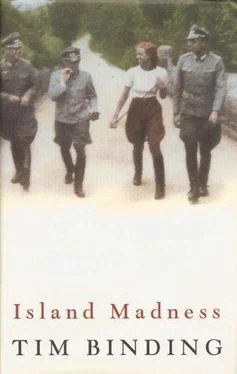“I wish you’d told me earlier,” Veronica admonished him, “you could have given some to me,” and the Captain, putting his finger to her Ups, told her that she was missing the point. Of course they could have been given away, of course they could have been saved. They could have been moved, for Heaven’s sake. The Major could have been consulted. But this had been both a declaration and an act of war, like the blitzkrieg, leaving the enemy reeling, with no cover, nothing to hang on to, sapping his will as well as attacking him without warning. And the choice of location! It was like the fall of France and the little railway carriage in the forest of Compiègne where the armistice of 1918 had been signed, a deliberate humiliation, choosing the very area in the garden where Bohde had been caught, literally red-handed, a year back. This was where they had chosen to strike! “You sound as if you approve,” Veronica said. “I do not approve,” the Captain admitted. “But as a military man I admire their tactics.” Then of course there had been the question of Isobel, whose morbid and misplaced presence in the Villa was felt at every turn. To Veronica’s delight she had discovered that far from appreciating Isobel, her grace and charm, her ability to bring a special lightness to the proceedings, Captain Zepernick thought very differently of her. Scheming had been the first word he used, and Veronica, her eyes wide, tried to look surprised that any woman could ever contemplate such an activity. That first meeting after the pantomime, for instance, that was no accident; it was stage managed, he had insisted, pleased with his English pun. Isobel had known very well who Major Lentsch was. She had been shadowing him about the town for a good six months before deciding to make her move, getting her aunt to make sure he went along that afternoon so that she could be pointed out. Isobel had left nothing to chance, dressing up in a costume as figure-hugging as the ski outfit at their earlier encounter, even as going so far as repeating the instructions she had given the Major while she advised a fallen Wendy how to fly. “Keep your knees bent,” she had ad-libbed. “Glide.”
“How do you know all this?” Veronica asked. “Molly,” the Captain replied. “Mrs Hallivand confided it all to Molly at your drama society.” Mrs Hallivand it emerged had disliked Isobel almost as much as the Captain, her one redeeming feature as far as he was concerned, but they differed as to the reason. Whilst Mrs H.’s antagonism had been founded on her anger at Isobel taking the Major away from her—“She would have liked to have seduced him herself, the old witch,” he said—the Captain’s aversion stemmed from the brazen confidence of Isobel’s class and the pleasures of a type of life which she believed to be her right. “The Major is no different,” he argued. “He tries to hide it behind philosophies of humanity and art, but he cannot. He was born with this sense of superiority, the same as she. The same as Mrs Hallivand. It is there for life, like a birthmark on the skin. It can never be eradicated.”
“But I thought you were friends, you and the Major,” she said, surprised in the virulence in his voice.
“Friends!” The Captain laughed and flicked cigarette ash into the air, as if to say, that is what my friendship is worth. “He has become a danger to us all. None of us know what he will do next. He disappears every evening, no one knows where. Bohde is convinced that he is engaged in some terrible plot.”
“Terrible plot! He’s with Ned Luscombe. He lives a couple of doors down from me. I see him come and go from my bedroom window.”
“At the Inspector’s house?”
“I just told you. He spends most of his time out in the garden, gazing up at the stars.” Veronica paused. “He looks lonely, unhappy.”
“The Major does not understand the meaning of this war. He would like to see it finished.”
“Wouldn’t we all?” she questioned.
“No. Some of us would like to see it won. For him it is an unfortunate interlude which he hopes will not interfere too much with his comfort. So, he has the best bedroom, the study is for his own private use, though he does nothing in there except write letters home.”
“I thought that was what studies were for.”
The Captain ignored her. “He always takes the first helpings of food, the first hot water for the bath, the first to have his tunic pressed, his boots polished, the first to have the use of Wedel.”
“Well, he doesn’t have the first use of me,” she joked.
Zepernick turned on her with venom.
“No? But that was of his choosing, was it not, not yours? You offered yourself up like a bar of Swiss chocolate.”
Veronica felt her face flare. She tried to deflect the blow.
“Anyway, what do you expect, he’s your superior,” she reminded him.
“Under one roof we should be comrades. But the Major does not see this. It is not only that be thinks himself better than me, but he believes that he is more cultured, that only he can appreciate the finer things. The wine in the cellar, for instance, he has to swirl around in his glass and pronounce good or bad, while I am expected to swallow it back in one gulp. The servant, Albert, thinks the same. And Mrs Hallivand? She can hardly bear to be in the same room as me. She tries to hide it but she is glad Isobel is dead. She has the Major all to herself now. In the afternoon the two of them sit in the drawing room like Adam and Eve overlooking some ruined garden of Eden. Ah, the Major! This island!” and he said it with a bitterness which Veronica had heard reverberating in her own inner voice, the times she had spent holding her tongue in front of Gerald, not daring to betray her life and her language, the look his mother had given her the one time she had been taken there to tea, looking askance at her shameless figure and her ruby red mouth, thinking, I know how you entrapped my poor innocent boy, you young hussy, and she, looking back defiant, had plucked at the swollen lapel of her blouse, as if to say, well, yes, that’s how we do it, one way or another, even a withered old prune like you, remembering too the revulsion on Lentsch’s face when she had bent down and placed herself loose in his hand, realizing that she too had not forgiven him for insulting her, for pushing her away in disgust. So she had taken Zep’s hand and pressed it hard against her, as if to say that’s what I want you to be, that’s what I want, a man who will be as heartless in love as he must be in war, who will offer me nothing but the time he is with me, understanding that that too may have its needling edge.
In the hallway the Captain propelled her to the stairs. The climb was always erotic, whoever went first. They kissed on the first landing, his mouth rough against hers, before breaking off. Up at the top the light was brilliant. The sun shone from the west down upon the steep-stepped red and ochre roofs and the hooting harbour, and to the left, tumbling down to the aquamarine sea, was the dark olive mystery of the wooded cliffs. It was an eagle’s nest there were in, and they the monarchs of the sky. He had brought two bottles of German wine, white and fruity. He stood them on one of the glass cases and strode to the window, turning to her, pulling her in front of him, pressing his hardened sex up against her buttocks, kissing her neck. He put his hands round and clasped her breasts.
“Careful.”
“Great things are happening to this island,” he said, swaying into her. “Great things. I used to think here was nothing, a backwater. But see?”
His arm swept over the panorama. She did not see. She rubbed herself against him from side to side.
“I feel like drinking,” he said. “What a day!”
As was their custom now, they moved the chaise longue from the back of the wall, up to the glass window. Veronica sat on one end. The Captain put his head in her lap and swung his feet up. Veronica slipped her hand inside his shirt. The bottle stood on the floor.
Читать дальше












